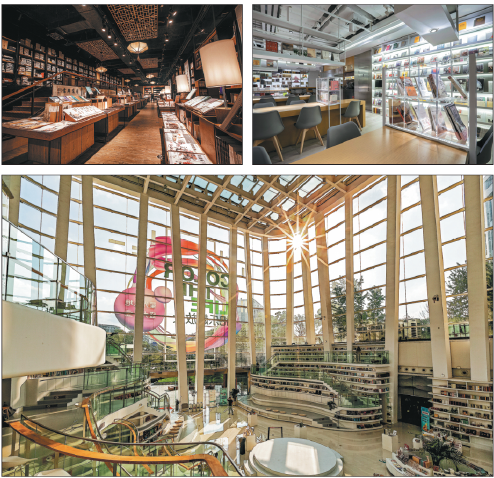Bookstores seek to write better plot
Sharp fall in customers and profits mean that a new storyline is needed to meet a challenging market, Wang Ru reports.

Bookstores hope a new page can be turned and a success story will unfold as COVID-19, unsurprisingly, led to significantly fewer customers and greatly reduced income, according to a survey.
The survey, published in the 2020-21 China Bookstore Industrial Report that was released during the 2021 China Bookstore Conference held in Beijing on March 30, found that 70 percent of surveyed stores experienced an income reduction in 2020.
The conference, sponsored by the Books and Periodicals Distribution Association of China, the Bookdao New Publishing Institute and Time Publishing and Media, was held to explore how to promote the innovation of services to encourage reading in physical bookstores and their further development in a post-pandemic era.
According to Cheng Sanguo, director of the Bookdao New Publishing Institute, although bookstores suffered heavily in the last year, China actually saw a net gain in bookstore numbers with the opening of 4,061 new sites, compared with the closure of 1,573.
"It means we didn't face a tide of bookstore bankruptcy as we had imagined, but the pandemic did magnify weaknesses in this industry and urged us to make changes," says Cheng.
He points out that physical bookstores cannot support themselves by solely selling books, since online bookstores offer more attractive prices. Neither can they turn to refreshments to fizz up their profits, as professional teahouses, cafes and establishments will always be able to provide a greater choice.
As a result, he believes that, in the long run, physical bookstores can benefit the most by providing a public cultural service.
"This type of service benefits people by satisfying their cultural needs, and that is the advantage of physical bookstores," Cheng says. "We can provide beautiful reading spaces with no time pressure to read books and various cultural activities for free."
Therefore, he advises bookstores to adopt a business-to-business approach, which requires bookstores to cooperate with the government, enterprises and institutions to support the provision of these services.
"We can build a brand through business-to-customer services, while benefiting from a business-to-business approach, so that a commercial closed loop would be established. It requires effort from the government, society and bookstores," says Cheng.
Liu Jun, chairman of Dayin Bookmall, supports Cheng's idea and cites the example of his bookstore. Liu says 30 percent of its income is derived from selling books, beverages and creative cultural products, while 40 percent comes from hosting cultural activities.
"On the basis that our bookstore can gather enough cultural resources, and that people in the city have an increasing need for quality cultural content, many organizations and enterprises would like to sponsor cultural activities on our platform. In that way we benefit," says Liu.
Zhu Handong, editor-in-chief of Time Publishing and Media, has a positive attitude to such bookstore development in a post-pandemic era. "China's Report on the Work of the Government has advocated universal reading for eight consecutive years, and government support for the industry has promoted its healthy development," says Zhu.
"Universal reading cannot be realized without bookstores. They promote quality content, organize reading activities and offer reading-related service," says Ai Limin, chairman of the Books and Periodicals Distribution Association of China.
"We are sure that, during the 14th Five-Year Plan (2021-25), the government will continue to support the development of physical bookstores with favorable policies and funds. But bookstores also need to weigh the situation, adopt an innovative commercial approach, find a way out of their respective dilemmas and develop in a quality way," he adds.
Awards covering the most beautiful bookstores, campus bookstores and community bookstores of the year were announced. A special award to honor bookstores which showed outstanding achievement in the face of the pandemic was bestowed upon a number of outlets, including Crystal Palace Arts Bookstore, Jiuwu Culture City and Zhanqiao Bookstore.
Beijing became the fourth "capital of bookstores" in 2020, following Chengdu, Xi'an and Shenzhen. The title recognizes its front-runner status in the number of bookstores, reading rates and policy support. Beijing had 1,994 physical bookstores in 2020, among which 639 were established in 2020.


Today's Top News
- Wang to meet foreign ministers of Cambodia, Thailand in Yunnan
- China's top legislature concludes standing committee session
- Thailand and Cambodia agree to temporary ceasefire
- NPC's 4th annual session slated for early March
- Civilizational links for a fairer world
- Manufacturing in China spurs global growth






























